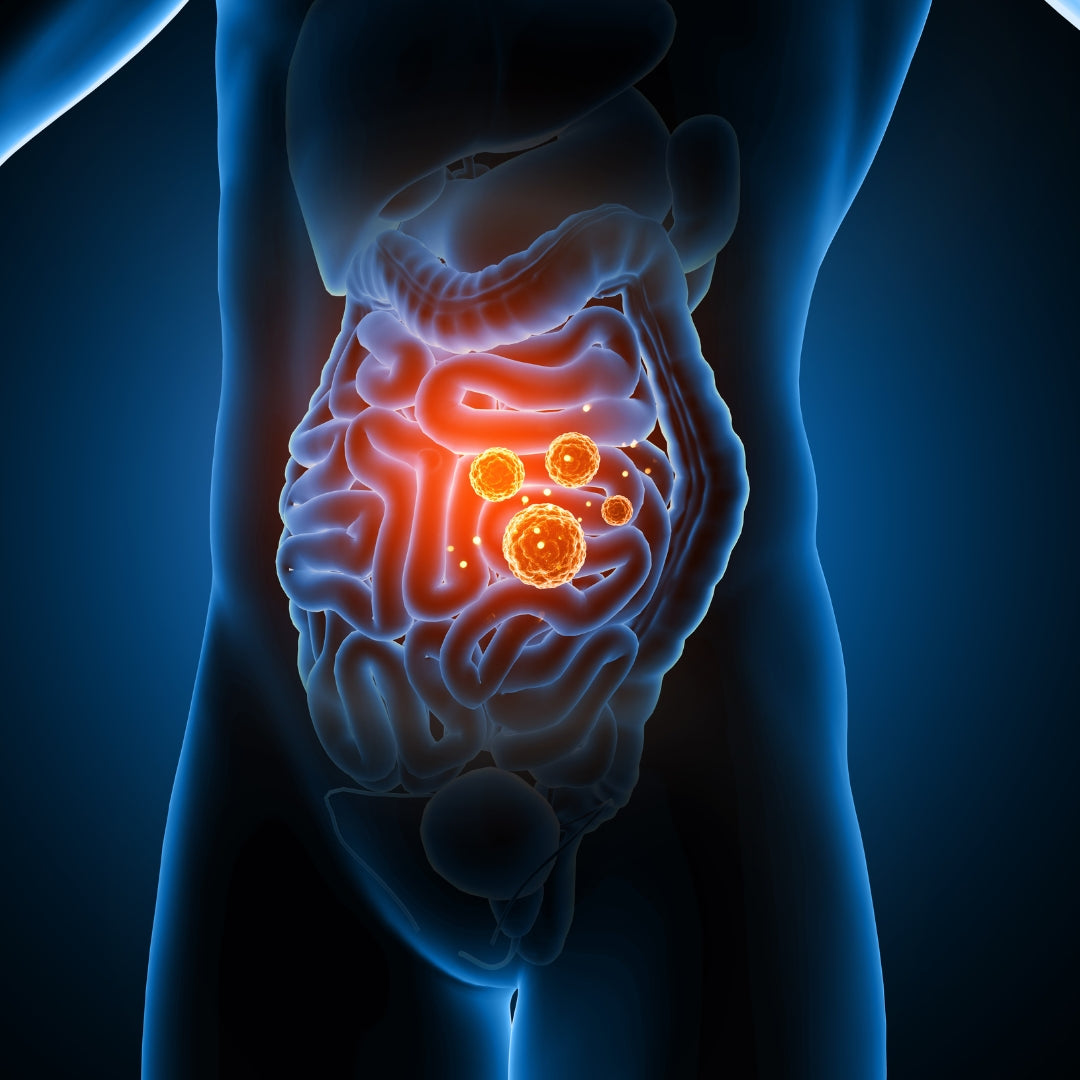What is IBS?
IBS is characterised by recurrent abdominal pain associated with changes in bowel habits. It is a chronic condition that can significantly impact a person's quality of life (1). The Rome IV criteria, established in 2016, define IBS as recurrent abdominal pain occurring on average at least one day per week in the past three months, associated with two or more of the following (2):
- Related to defecation
- Associated with a change in stool frequency
- Associated with a change in stool form or appearance
Types of IBS
Research has identified several distinct types of IBS (3 & 4), primarily based on predominant bowel habits. These types include:

Subtypes of IBS
In addition to the main types of IBS, researchers have identified several subtypes based on underlying mechanisms and associated symptoms:
1. Post-infectious IBS (PI-IBS)
PI-IBS develops following an episode of acute gastroenteritis (5). Studies suggest that up to 10% of individuals who experience a severe gastrointestinal infection may develop IBS symptoms that persist long after the initial infection has cleared (5).
Key features:
- Onset of IBS symptoms following a bout of infectious gastroenteritis
- May be associated with alterations in gut microbiota
In a recent meta-analysis of studies from 1994–2015 including over 21,000 patients that had an episode of infectious enteritis, IBS-M and IBS-D were found to be the most common phenotypes, accounting for 46% and 40% of the cases, respectively (6).
2. Visceral Hypersensitivity IBS
This subtype is characterised by an increased sensitivity to pain and discomfort in internal organs (7). According to London Gastroenterology Center (2024), patients with visceral hypersensitivity may experience pain or discomfort at lower thresholds of intestinal distension compared to healthy individuals (7).
Key features:
- Heightened perception of pain and discomfort in the gut
- May be associated with altered pain processing in the central nervous system
- Can occur across all IBS types
3. Food-sensitive IBS
Some individuals with IBS report that certain foods trigger or exacerbate their symptoms. This subtype is particularly relevant to the growing interest in dietary interventions for IBS management (8)
Key features:
- Symptoms worsen after consumption of specific foods
- Common triggers include fried foods, fatty foods, dairy, wheat, fibre, chocolate, carbonated drinks, caffeine, and alcohol
- May benefit from dietary modifications and elimination diets
4. Stress-responsive IBS
This subtype highlights the strong connection between stress and IBS symptoms (9). Patients with stress-responsive IBS may experience flare-ups during periods of increased psychological stress or anxiety.
Key features:
- Clear association between stress levels and symptom severity
- May benefit from stress reduction techniques and psychological interventions
- Often coexists with anxiety or depression
5. Microbiome-associated IBS
Emerging research suggests that alterations in the gut microbiome may play a role in IBS pathogenesis (10). This subtype focuses on the potential contribution of dysbiosis (imbalance in gut bacteria) to IBS symptoms (10).
Key features:
- Alterations in the diversity and composition of gut microbiota
- May respond to probiotics or other microbiome-targeted therapies
- Ongoing research into the role of specific bacterial strains in IBS
Conclusion
Understanding the different types and subtypes of IBS is crucial for both accurate diagnosis and effective management. While these categories provide a framework for classifying IBS, it's important to note that individual patients may not fit neatly into a single category. Many patients experience overlapping symptoms or may transition between subtypes over time.
As research in this field continues to advance, new subtypes and refined classifications may emerge. This evolving understanding of IBS highlights the complex and multifaceted nature of the disorder, emphasising the need for personalised approaches to diagnosis and treatment.
By recognising the diverse manifestations of IBS, healthcare providers can tailor interventions more effectively, ultimately improving outcomes and quality of life for individuals living with this challenging condition.
References:
- Canavan, C., West, J., & Card, T. (2014). The epidemiology of irritable bowel syndrome. Clinical epidemiology, 6, 71–80. https://doi.org/10.2147/CLEP.S40245
- Rome IV Criteria. (n.d.). Rome IV Diagnostic Criteria for FGIDs: Disorders of Gut-Brain Interaction. https://theromefoundation.org/rome-iv/rome-iv-criteria/#:~:text=IRRITABLE%20BOWEL%20SYNDROME&text=Recurrent%20abdominal%20pain%20on%20average,in%20form%20(appearance)%20of%20stool
- John Hopkins Medicine. (2024). Irritable Bowel Syndrome (IBS). https://www.hopkinsmedicine.org/health/conditions-and-diseases/irritable-bowel-syndrome-ibs#:~:text=Mostly%20diarrhea%20and%20abdominal%20discomfort,%2DU)%20%E2%80%94%20symptoms%20vary
- Kibune Nagasako, C., Garcia Montes, C., Silva Lorena, S. L., & Mesquita, M. A. (2016). Irritable bowel syndrome subtypes: Clinical and psychological features, body mass index and comorbidities. Revista española de enfermedades digestivas, 108(2), 59–64. https://doi.org/10.17235/reed.2015.3979/2015
- Berumen, A., Edwinson, A. L., & Grover, M. (2021). Post-infection Irritable Bowel Syndrome. Gastroenterology clinics of North America, 50(2), 445–461. https://doi.org/10.1016/j.gtc.2021.02.007
- Klem, F., Wadhwa, A., Prokop, L. J., Sundt, W. J., Farrugia, G., Camilleri, M., Singh, S., & Grover, M. (2017). Prevalence, Risk Factors, and Outcomes of Irritable Bowel Syndrome After Infectious Enteritis: A Systematic Review and Meta-analysis. Gastroenterology, 152(5), 1042–1054. https://doi.org/10.1053/j.gastro.2016.12.039
- London Gastroenterology Center. (2024). Treatment for Visceral Hypersensitivity in IBS. https://www.gastrolondon.co.uk/ibs-treatments/treatment-for-visceral-hypersensitivity-in-ibs/#:~:text=Visceral%20hypersensitivity%20means%20a%20general,register%20to%20you%20as%20pain
- NHS. (2024). Irritable bowel syndrome (IBS): Diet, Lifestyle, and Medicines. https://www.nhs.uk/conditions/irritable-bowel-syndrome-ibs/diet-lifestyle-and-medicines/
- Khatri, M. & WebMD Editorial. (2023, March 25). Stress, Anxiety, and Irritable Bowel Syndrome. Web MD. https://www.webmd.com/ibs/stress-anxiety-ibs
- Shaikh, S. D., Sun, N., Canakis, A., Park, W. Y., & Weber, H. C. (2023). Irritable Bowel Syndrome and the Gut Microbiome: A Comprehensive Review. Journal of clinical medicine, 12(7), 2558. https://doi.org/10.3390/jcm12072558



